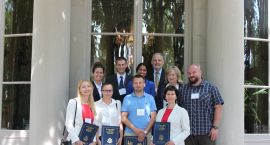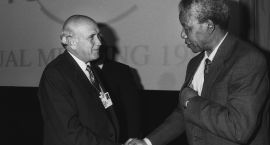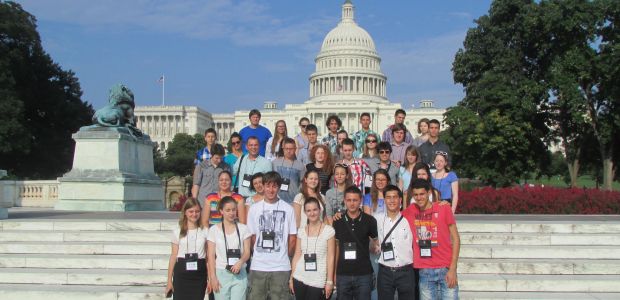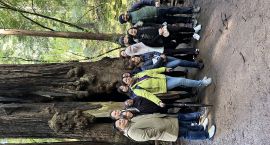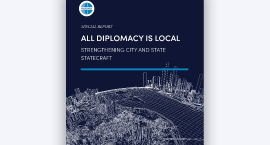How can young leaders impact a local community? This question, and others, is what the Youth Leadership Program with Central Europe (YLPCE) strives to answer. The program – funded by the U.S. Department of State’s Bureau for Educational and Cultural Affairs and organized by Meridian International Center – ran consecutively from 2011 to 2013, and brought together over 170 participants from Hungary, Serbia, Slovakia, Slovenia and the U.S. to work on leadership development through immersive exchange experiences.
Unlike many of Meridian’s exchange programs, the Youth Leadership Program with Central Europe constitutes an actual bilateral exchange between different countries. Many of Meridian’s other programs include foreign visitors travelling to the U.S. but no reciprocal visit. The YLPCE not only brought youth and adult leaders from Central Europe, but subsequently sent students from the cities visited in the U.S. to Serbia and Hungary. For those travelling to the U.S., their visit began in DC for an overview of U.S. history and politics, as well as a chance to develop their teambuilding and consensus building skills. Participants then continued to visit certain states in the U.S. including North Carolina, Kansas, Missouri, and Vermont.
It was in these individual cities that participants were given the chance to exercise their leadership skills, focusing on issues such as underserved youth, environmental conservation and international hunger relief. In these American communities, participants attended conflict resolution and team building workshops, as well as meetings with grassroots organizations. The focus issues were chosen for their prevalence in the American communities visited, and across the areas in Central Europe where the participants reside. Throughout the program, youth were taught how to develop a successful action plan in their communities, and they completed the program with a polished presentation on their individual plans to be implemented when they return home. To continue the success and reach of the YLPCE, Meridian has awarded small grants to program alumni to fund their community-building projects. In Bor, Serbia, YLPCE alum Isidora Takich received a grant to fund her youth and reading initiative. To help youth with little to no access to literary programs, Takich accompanied the children to a local book fair that provided a discount so that every student could purchase two books. Two weeks later, Takich organized a book discussion with the children to enhance their literary curiosity and engagement.
Other projects receiving YLPCE grants include an initiative to build cultural awareness between youth in Slovenia through a summer camp; a cultural festival in Northeast Hungary aimed toward underprivileged children and students with disabilities; a school eco-club in Slovenia with a concentration in a school-wide recycling campaign; and a program in Kansas City, MO designed to get underserved youth in the community to become engaged in the arts by painting inspirational murals in local schools and shelters. Alum from Burlington, VT created a community organization called Technology for Tomorrow, which teaches the elderly community how to utilize technology in their everyday life. These programs, all designed and implemented by YLPCE alumni, show the true effect the program has on inspiring youth to take action in their own communities. In a survey conducted after the program’s end, it was found that students overwhelmingly considered YLPCE a life-changing experience that built their cross-cultural awareness and developed leadership skills.
Over and above the leadership and advocacy skills these students gained, a greater global awareness proved to be another benefit of the program. When the participants were asked what had influenced their knowledge of the U.S., Hungary, Slovakia, Serbia and Slovenia, 90% chose the YLPCE over the news, radio, TV, and other social media. American and Central European students were integrated from the very beginning of the program, through homestays for their international counterparts and the leadership and team-building activities together. When American students travelled abroad to Serbia and Hungary, the programs in which they engaged were very similar to those in the U.S., including meetings with local youth organizations and non-profits, and workshops developing leadership and project management skills.
When speaking of their experiences in the program, participants showed enthusiasm and eagerness about the amount of personal growth they gained from the summer spent abroad with YLPCE. One participant surveyed commented, “YLPCE was definitely a once in a lifetime experience for me. I am really grateful for it as I really changed my goals, priorities and thinking in this one month”. Another noted that, “This program is the most incredible thing to have ever happened to me and motivated me to be a more active member of my local (and international) community”. YLPCE has the power to not only strengthen communities and cultural ties, but to effect positive change in the lives of every participant. The young participants will, no doubt, go on to use the skills and practices from YLPCE to make a difference in our world.
As the 2013 program comes to a close, the Alumni All Stars will be selected to present their successes to the next generation of young leaders in Belgrade, Serbia during the summer of 2014. The All Stars are those participants who have shown exceptional growth and initiative following their participation in the program.









